Let’s talk about eco-friendly diapering, both what to look for and potential pitfalls to avoid.
Table of Contents
Babies poop and pee. A lot. This means that unless you’ll need something to cover your baby’s bum. There’s a time and a place for the conversation over cloth diapers versus disposables, and… that’s here.
But for now, here are the best, most eco-friendly disposable diapers available today, followed by a quick look at what to avoid when choosing disposable diapers.
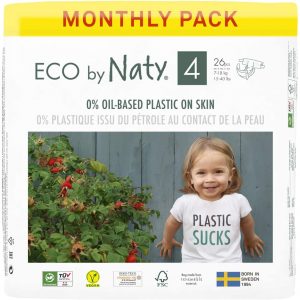
Our top pick for eco-friendly diapers
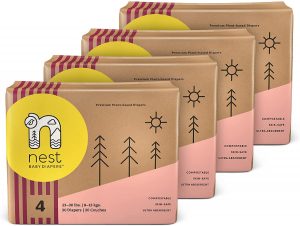
Eco-friendly diaper brand that’s mostly compostable & free from harmful chemicals
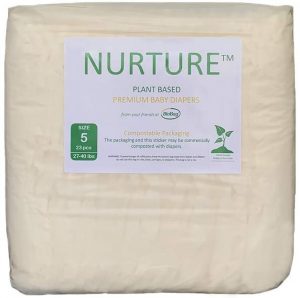
One of the best picks around, but hard to find in the US
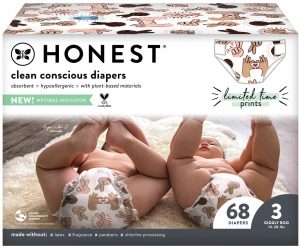
Decent eco-friendly diaper option due to wide availability
Personally, although I’m committed to cloth diapering, I still made sure to have a couple of packs of eco-friendly disposable newborn diapers on hand for that first couple of weeks (or years!) when everything is a steep learning curve. I’m super grateful to have received not one but two sets of cloth diapers from friends but just knowing the disposables are there is reassuring.
What to avoid in disposable diapers
First, let’s go over some tips for what to avoid in a disposable diaper. There are very few truly green brands out there, so knowing the pitfalls can be a big help.
Disposable diapers usually comprise a topsheet, acquisition distribution layer, core wrap, absorbent core, waistband, backsheet, leg cuff with elastic, and a fastening system. Each of these layers can contain chemicals you’d rather not have in direct contact with your baby’s sensitive skin.
See also: The cost of disposable diapers: a case study
In short, most disposable diapers contain a plethora of petroleum products that will never biodegrade but do slowly degrade in landfill to leach toxic chemicals into the air, water, and soil, harming wildlife and the planet as a whole.
Eco-friendly diaper brands cover these bases
What you want to look for then are diapers made by companies that acknowledge these pitfalls and take steps to reduce the environmental impact and toxicity concerns of their products. This means:
- Avoiding plastics and petroleum derivatives wherever possible
- Favoring diapers made with recycled plastic where plastics are deemed necessary
- Avoiding chlorine bleach and formaldehyde
- Choosing diapers made with compostable bioplastics
- Avoiding dyes, fragrances and parfum
- Asking about chemical processes used to create absorbable wood cellulose
- Avoiding bamboo/rayon as this is a chemically intensive fiber.
It’s also good to look for diapers that can be wholly or at least partially composted, either at home or in municipal facilities. And, as always, look for companies that minimize the use of packaging and favor eco-friendly packaging made with recycled paper.
A small number of companies make genuinely eco-friendly and non-toxic disposable diapers. Here are my top picks.

Naty Organic Diapers
Highlights: One of the OGs of eco-friendly disposable diapers, made using plant-based bioplastics and renewable materials by a company that clearly cares. My top pick!
Naty was launched in 1998 as one of the first eco-friendly disposable diapers. These diapers are made with plant-based bioplastics instead of petroleum-based plastics and are waterproof and breathable. The absorbent layer is made with biodegradable cellulose fluff pulp that is FSC certified, blended with a small amount of SAP. The diapers are also free from parabens, phthalates, mineral oils, PABA and DEA and are ECOCERT certified. The dyes used to create the cute patterns are free from heavy metals and other troublesome chemicals.
Naty use renewable resources as much as they can, and their diapers are one of the most environmentally friendly disposable options available and one of the two brands I chose to have on hand just in case. The company produces a regular sustainability report and has the goal of making all their product packaging from 100% renewable materials.
We Tested Eco by Naty Diapers
Rated as our top pick for sustainability, our team tested Eco by Naty by using the diapers for 2 weeks with our founder John’s 3 month old baby. We liked the soft texture of the diapers, but there was very little padding for a diaper that still felt bulky to put on a baby. Some families will not like the lack of an indicator, but the green credentials are unassailable.
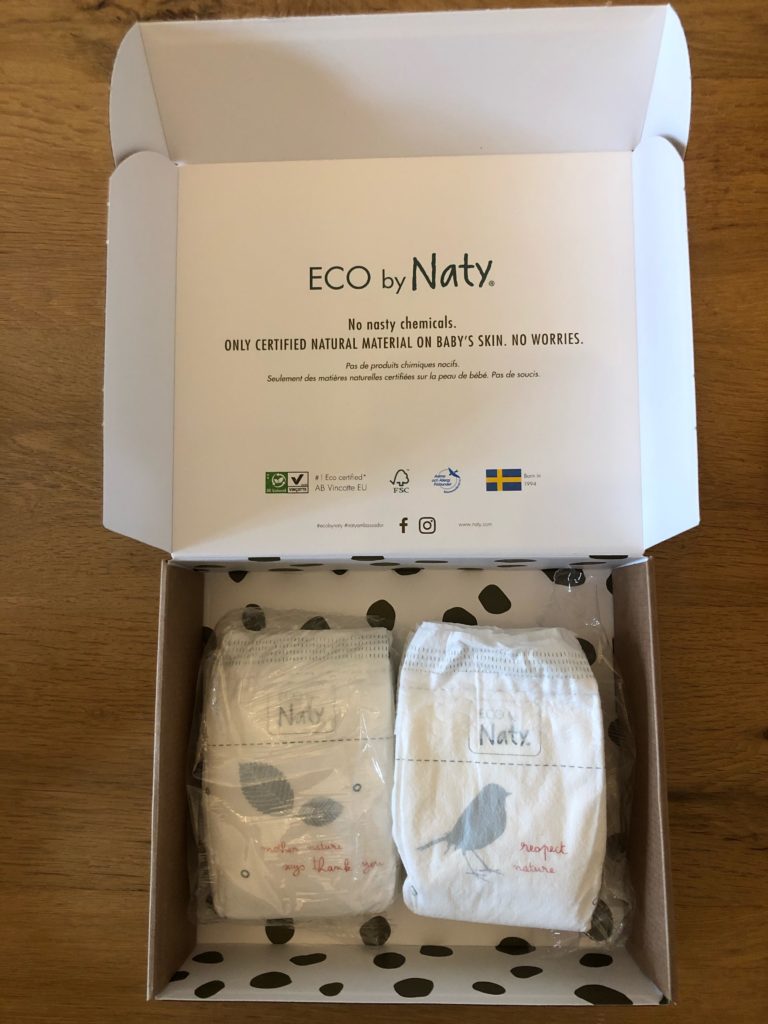
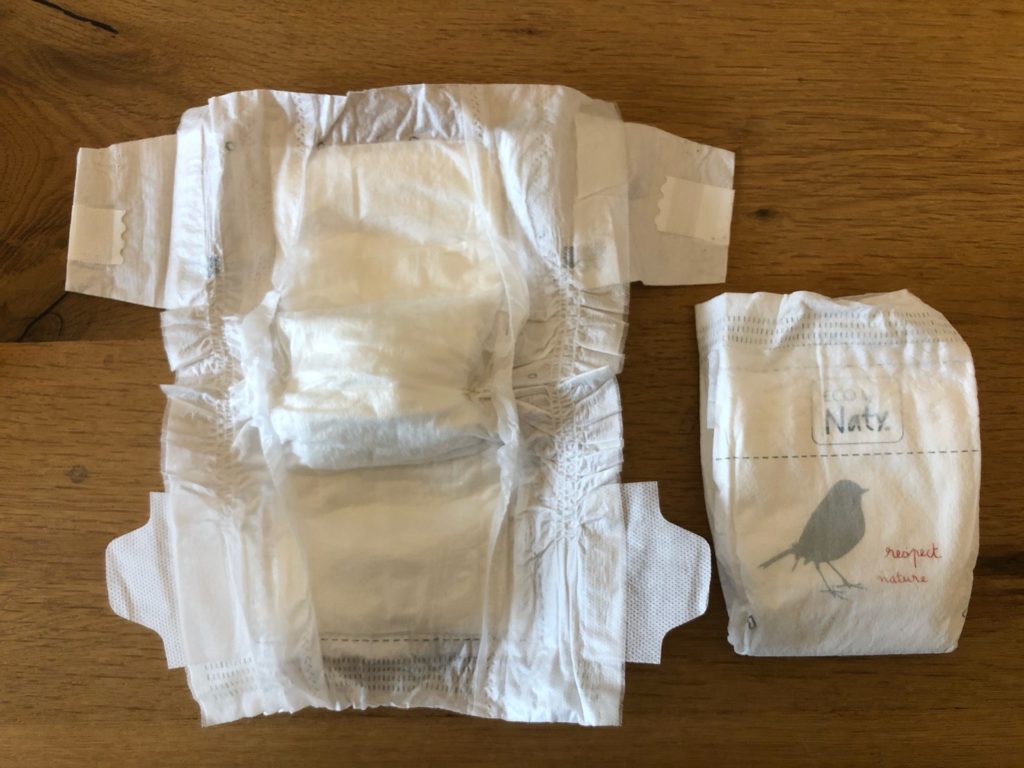

Nest Diapers
Highlights: A compostable (with limits) diaper that is more eco-friendly than most and free from a wide range of troublesome chemicals.
Nest diapers are independently tested and Oeko-Tex 100 & SGS certified. They are free from fragrance, chlorine, parabens, phthalates, and lotions that could potentially cause an allergic reaction. They are also free from dyes and are plain white with not even a logo.
The diapers are packaged in a paper bag with a thin film of polypropylene, which is recyclable, and the diaper itself is made with wood pulp, bamboo, polylactic acid (PLA), SAP, starch, polymer spandex, polypropylene, elastin, and synthetic rubber glue. As such, these diapers contain petroleum-derived plastics and are not entirely biodegradable or natural. Still, they are compostable, so are arguably better for the environment than most plastic-containing disposable diapers.
You can only compost Nest diapers using a diaper composting service, not your regular municipal or backyard composting methods. Indeed, in most municipalities, it is illegal to place human waste (including compostable diapers) in city compost bins or to compost them on your property.
The company is in the process of concluding an updated biodegradability test and is working with partners to increase the number of availability composting facilities that accept baby diapers. Right now, they partner with Do Good Diapers, servicing Minneapolis–Saint Paul, Twin Cities Metro, Minnesota, and Wisconsin, and Tiny Tots, servicing San Francisco, Oakland and the San Jose Bay Area. You can even request a free sample of Nest diapers through Tiny Tots if you live in their service area!
Nest diapers seem to be a bit wider and larger than standard sizes, which means you can get a bit more use out of the smaller sizes before having to size up. I made sure to have a pack of the smallest size of these on hand, along with a pack of newborn Naty, so all my bases (butts!) are covered no matter what size baby arrives.
We Tested Nest Diapers
Another great option for an eco-friendly diaper, Nest was actually our favorite brand to use for our founder’s 3 month old. The diapers have beautiful artwork, are lightweight, and are on the thin side, but still felt sturdy without the awkward bulkiness of Eco by Naty. The texture is soft and supple and the indicator is a big help.
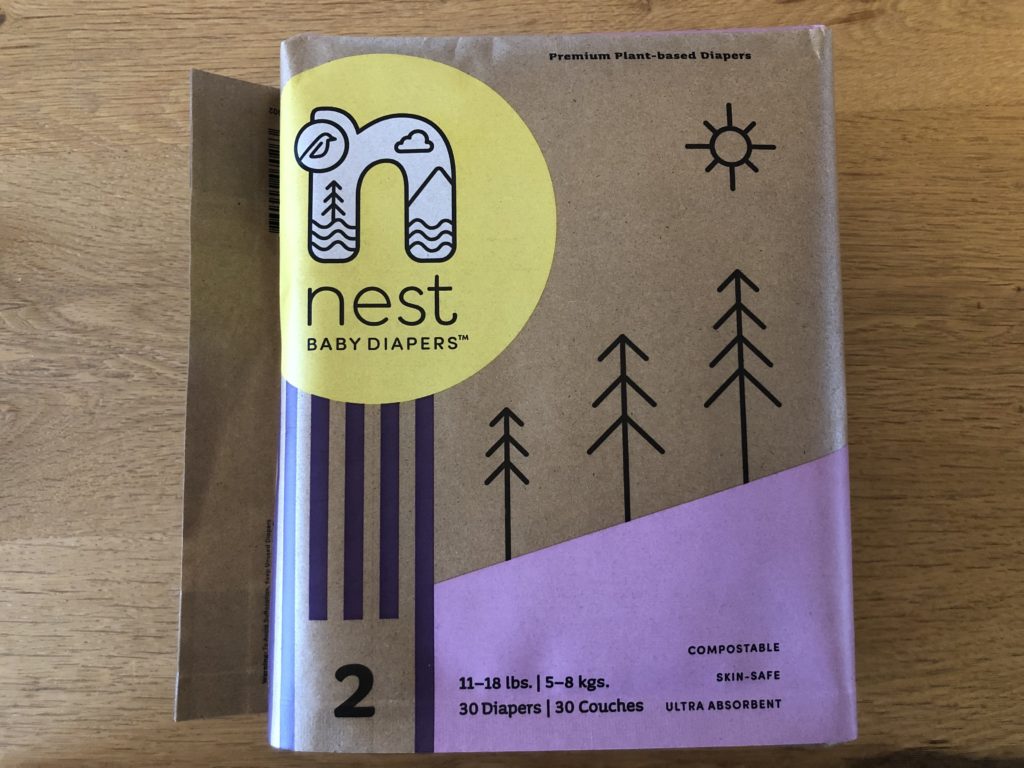
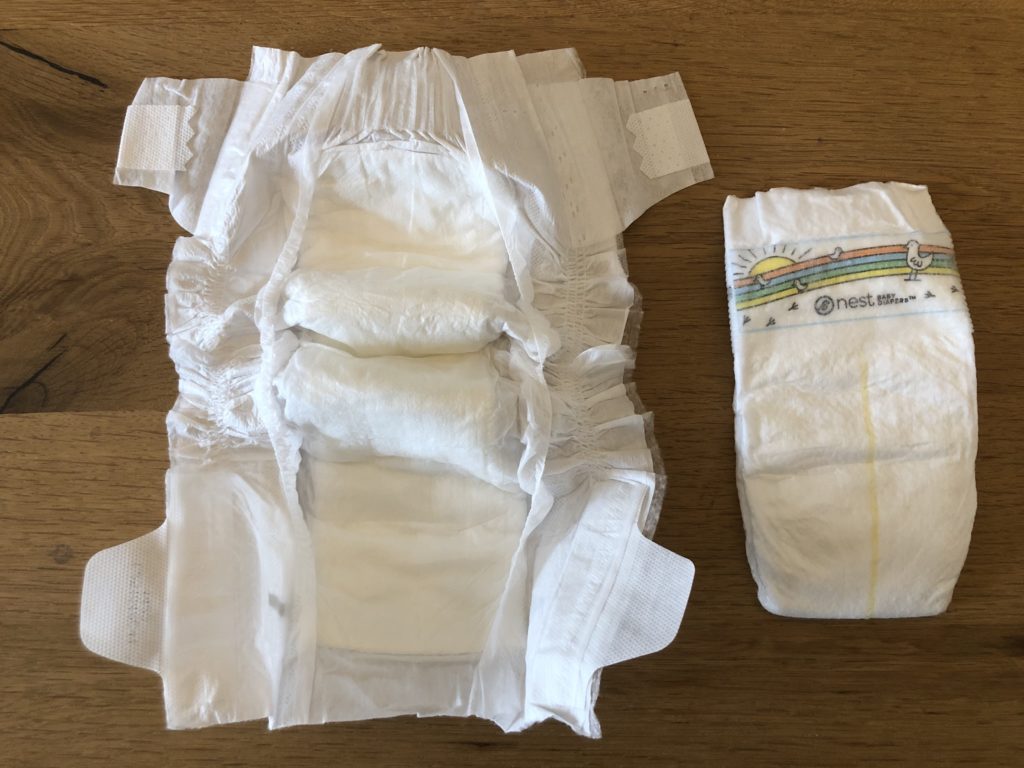

Nurture diapers by Biobag®
Highlights: An excellent eco-friendly disposable diaper choice, but made in Denmark and not widely available in the US. If you can find them, get them!
Nurture diapers by Biobag® are compostable, soft, super absorbent, have a helpful wetness indicator, and are free from chlorine, parabens, dioxins, phthalates, toxic adhesives, latex, optical brighteners, skincare lotions, perfumes, essential oils, and odor eliminators. The diapers are designed in the USA by BioBag and produced in Denmark using certified ecologically responsible manufacturing practices. They have one of the highest bio-based contents of any disposable diaper and even their backsheet is compostable.
The diapers are manufactured in an ecologically friendly manufacturing facility that uses 100% clean and renewable wind energy and undergoes strict, rigorous, third-party environmental inspections of their products including life cycle analysis from raw material to finished product to post-consumer processing. An impressive 95% of all waste from the production of the diapers is recycled, and the wood used for pulp is derived from sustainable forestry, where more trees are planted than felled.
Nurture diapers are eligible for Earth-Baby composting (as is the packaging), but don’t try composting them at home or in municipal compost.
We Tested Nurture Diapers
Again, as with Nest, when using these diapers, we found them light, but with a nice tight fit, without bulkiness. Great diapers, and definitely eco-friendly, but the batches we used arrived with an indicator that was already highlighted green, even when the diapers hadn’t been used. This was a frustrating feature that prevented us from re-ordering.
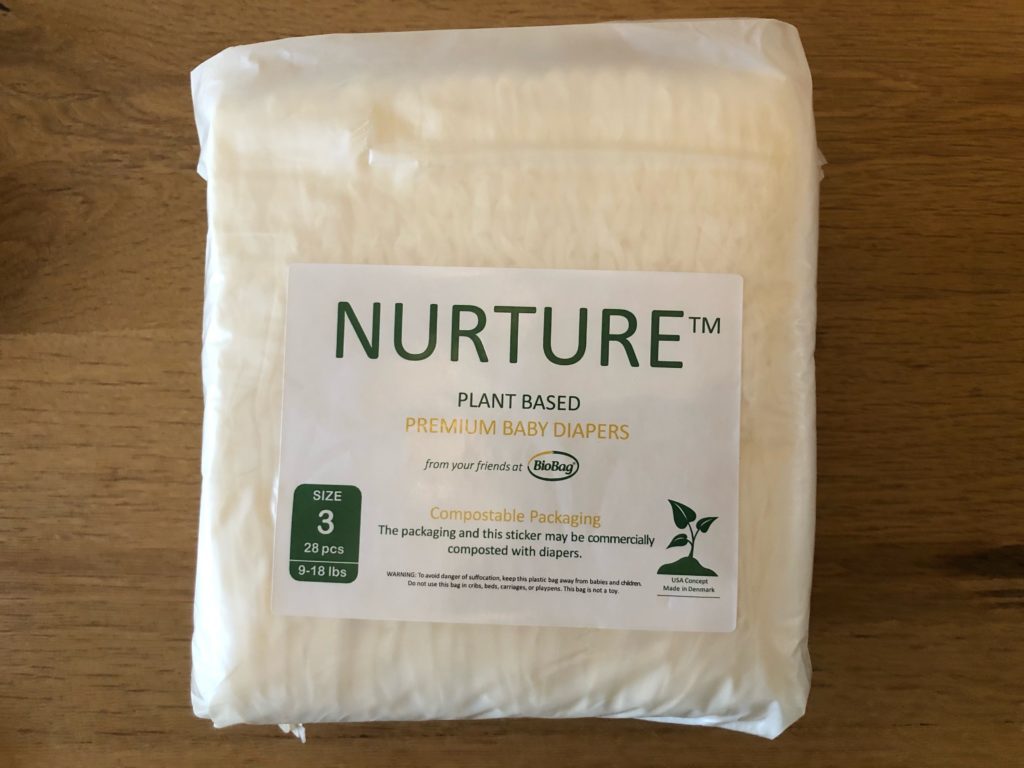
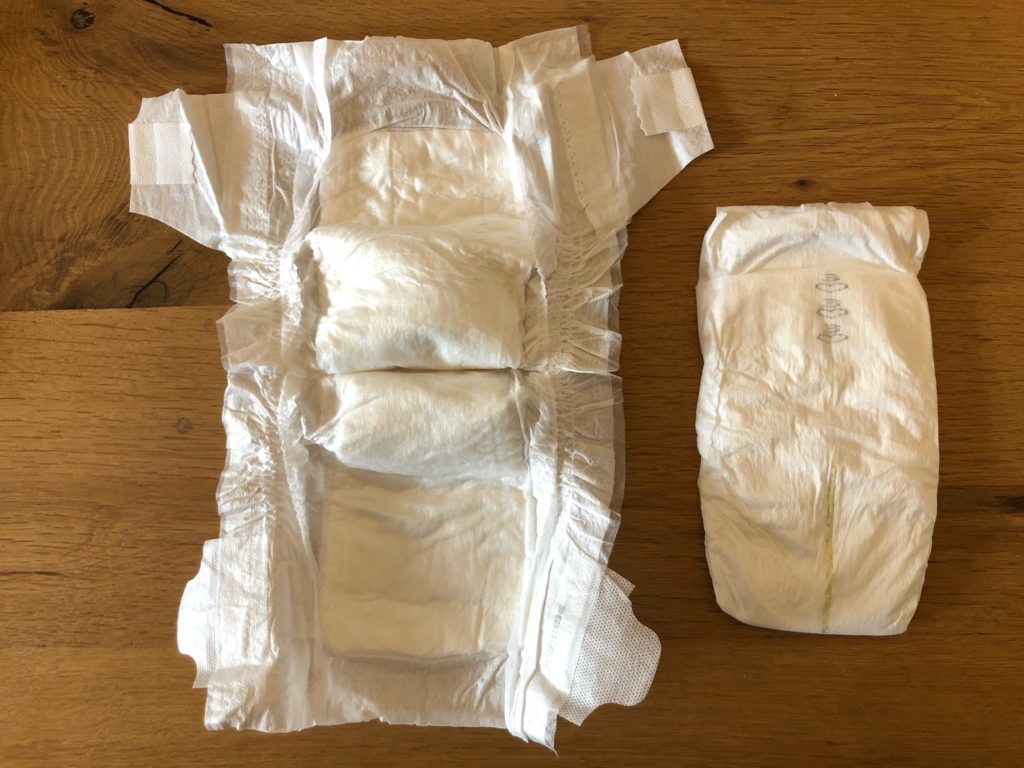

Honest Company diapers
Highlights: Widely available and easily recognizable disposable diaper from a brand that does better than most but is by no means perfect. Somewhat eco-friendly but still made with petroleum derivatives.
Honest Company disposable diapers are made with totally chlorine-free wood pulp from sustainably managed forests, citrus extract and liquid chlorophyll as odor inhibitors, and a plant-based polylactic acid (PLA) film for their outer layer.
These diapers are much more widely available than the other options above, and you may even be able to grab a pack off a store shelf in a pinch. However, while Honest Company likes to market itself as super eco-friendly, these diapers are made with polyolefin adhesives and polypropylene, as well as a sodium polyacrylate (SAP), so they’re not biodegradable or totally eco-friendly. They are far better than most conventional diapers, though, and pose a far lower risk to human or environmental health.
We Tested Honest Company Diapers
We tested Honest company diapers for several days but didn’t re-order because they don’t have the eco-credentials of the other brands listed here and many of the designs completely obscure the visibility of the indicator which makes these diapers very impractical to use.
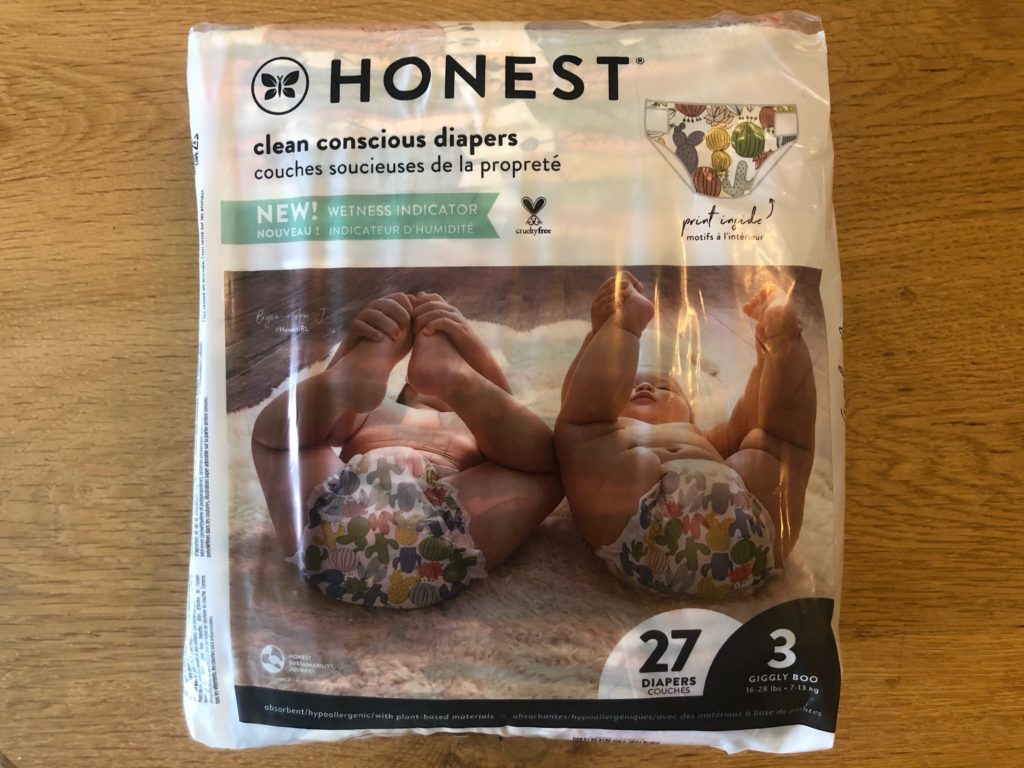
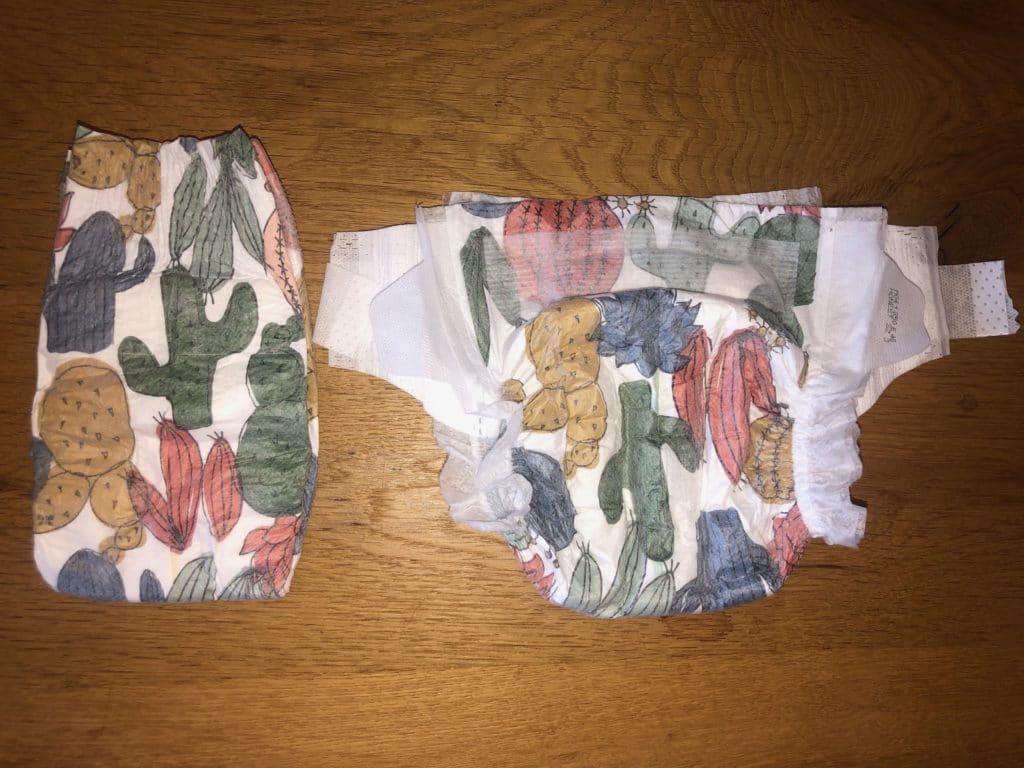
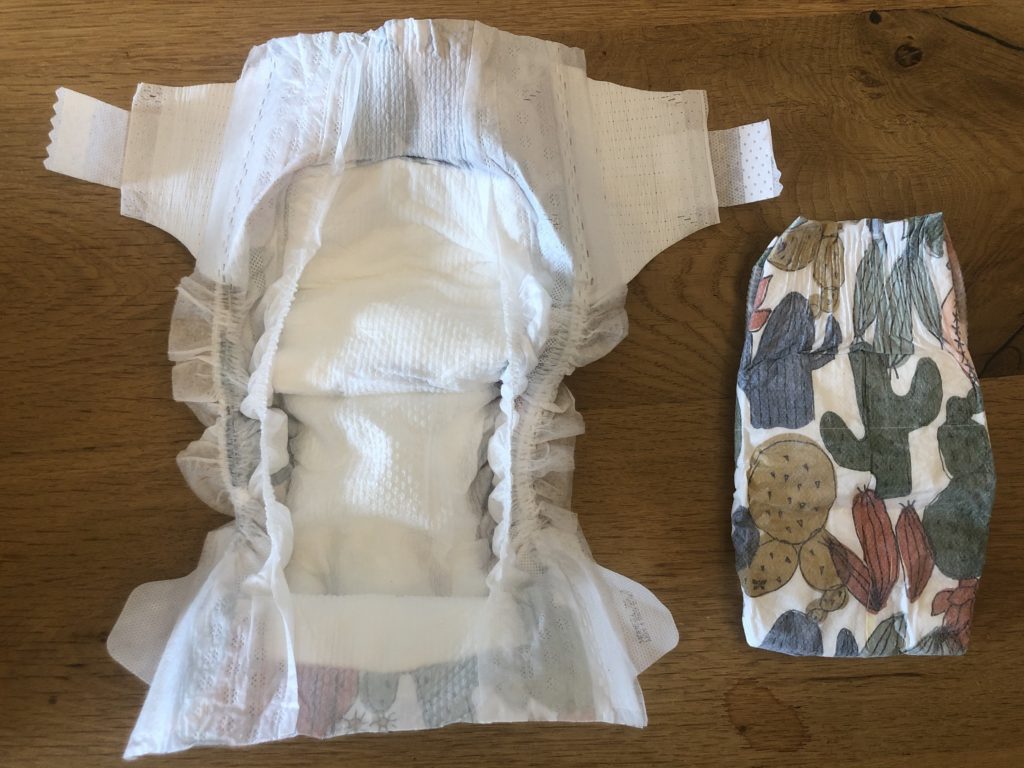
Looking for more eco-friendly baby products? You may enjoy the following posts:
Hi – I found this article really helpful! Do you have any highlighted information on companies such a Dyper (made from bamboo which you article says is in fact NOT eco friendly) and Coterie? These brands are catching wind and I was almost sold on Dyper until I read you article.
Absolutely! When it comes to covering your baby’s needs, the conversation around cloth diapers versus disposables often arises. While each has its merits, it’s crucial to address the environmental impact, especially with the volume of waste generated.
Disposable diapers might seem convenient, but they contribute significantly to landfills due to their non-biodegradable nature. That’s where innovative solutions like diaper recycling technologies, such as those showcased at https://diaperrecycling.technology/, come into play. These advancements offer promising ways to tackle the environmental challenges posed by diaper waste.
By exploring options like diaper recycling technologies, we can actively seek sustainable alternatives and reduce the burden on landfills. This conversation extends beyond the simple choice of diapering and delves into the realm of responsible waste management, aligning with efforts to create a cleaner and more sustainable future for our little ones.
So, while the debate between cloth and disposable diapers continues, it’s essential to consider evolving technologies like those highlighted on https://diaperrecycling.technology/ that aim to mitigate the environmental impact of diaper waste, ensuring a healthier planet for generations to come.
Hi Honey,
Diaper recycling would certainly be an improvement on what happens to almost every diaper currently.
I’m curious if you work for the company you referenced? It’s not clear from their website that they recycle used diapers. Is this tech for factory seconds or unused diapers to reclaim raw materials? Otherwise, what’s the sanitary process for waste removal?
Would love to find out more! Feel free to email me with extra info.
Thanks,
Leigh